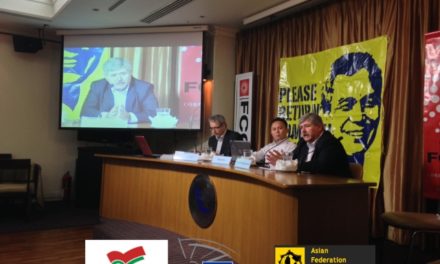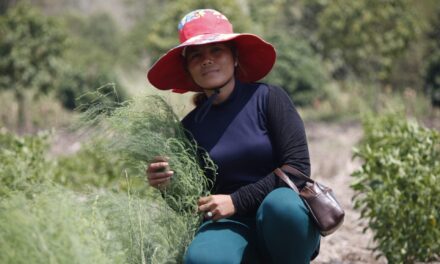Western capitalism and its multinational tools have had plenty of opportunity to fulfill their promise to bring prosperity to all. That they have failed is becoming more evident by the day.
The mission of the World Bank, which is probably the richest international organisation in the world in terms of human and financial resources, as engraved on the walls of its headquarters in Washington, DC, is to eradicate poverty.
But since its establishment five decades ago, the policies of the World Bank have contributed to greater and widening income inequalities between and within states. Besides, the number of poor people based on the World Bank’s definition of poverty has actually increased. And the natural environment has seriously deteriorated.
The president of the World Bank once queried me about the Buddhist conception of prosperity. I responded that from the Buddhist perspective a prosperous person is (1) self-reliant, (2) has self-dignity and is proud of his or her culture, (3) is humble and values simplicity (in short has contentment), (4) is generous, and (5) is ever mindful.
The president of the World Bank then noted that this Buddhist definition of prosperity does not mention about income and wealth at all. I responded that money and wealth are like a double-edged dagger.
The Buddha even stated that in reality money is more a source of suffering than of happiness.
The political and economic system under capitalism and consumerism is capable of using the mass media to indoctrinate the people to feel that they are poor due to the following reasons.
(1) Capitalism opens no avenue for self-reliance. Everyone is at the mercy of the infamous market, is completely dependent on the market, which is free but riven with injustices.
(2) Capitalism, which destroys local and traditional cultures, fosters an inferiority complex. In their places, capitalism promotes a culture of materialism and consumerism often called McWorld Culture.
(3) Capitalism views contentment as a sign of weakness and abnormality. Since the times of the Phibunsongkram and Sarit Thanarat military dictatorships, the Thai ruling elites have been indoctrinated by American modernisation experts to abhor contentment. Back in those days, monks were even forbidden to preach contentment. A contented person does not aspire to things beyond his or her needs. On the contrary, capitalism breeds competition for wealth, status, etc. This is a root cause of poverty.
(4) Capitalism teaches the people the gospel of wanting and possessing, and not giving. Moreover, an act of giving in the capitalist context is often laden with ulterior motives, e.g., to obtain benefits in return.
(5) The practice of mindfulness in the capitalist context is almost impossible. Investment is all about taking risks and chances in order to obtain the greatest profit.
Many years ago, World Bank officials concluded that the inhabitants of Pak Moon communities in Ubon Ratchathani, Siam, met their criteria of poor and marginalised people. The World Bank thus helped fund the Thai government’s construction of the Pak Moon dam to help the poor people in Siam in general, and the poor Pak Moon villagers in particular.
The unfortunate result is that the World Bank and the Thai government ended up destroying the Pak Moon villagers’ way of life, which is rooted in Buddhism and local traditions, as well as environmental sustainability.
The case of Pak Moon illustrates how knowledgeable and well-meaning experts trained in the Western tradition were blinded by ignorance and prejudice and ended up destroying a community and the natural environment.
At least, the World Bank is beginning to realise its shortcomings and failures: it now recognises that the construction of large dams is more destructive than beneficial. World Bank officials even went out of their way to listen to the grievances of poor people at first hand. There is now a small office in the World Bank that deals with poor people. The employees of this office have travelled worldwide to interview some 60,000 poor people.
The product of their endeavour is a two-volume book entitled Voices of the Poor. It is also noteworthy that the staff members of this small office are all motivated by spirituality and morality and that they all value humility and simplicity. These characteristics enabled them to truly open their minds and listen to the poor.
SOCIALISM WITHOUT TOTALITARIANISM
Let us return to Siam. During the reign of King Rama VII, the government of absolute monarchy commissioned Dr Zimmerman of Harvard University to examine the kingdom’s economic situation.
The Zimmerman report stated that the country had no poor citizens.
On the contrary, Mr Pridi Banomyong who had lived with the poor in Ayutthaya understood the problems of poverty and indebtedness of farmers. Therefore, when he led the 1932 revolution, he not only strove for political equality but economic justice as well.
This reasoning is evident in his Draft on National Economic Policy, which is commonly known as the Yellow Book. Unfortunately, aristocrats of the ancien regime relied on the White Book, which was allegedly written by King Rama VII, to refute and overwhelm Mr Pridi’s proposal. They instead argued that not even dogs die of starvation in prosperous Siam. Poverty in Siam was mainly the result of laziness, gambling, and drug addiction, not unjust socioeconomic structures, they asserted.
Lamentably, Mr Pridi’s Draft on National Economic Policy was crushed in its cradle in 1932.
Great Britain successfully established a welfare state after the Second World War; that is, almost two decades after the vision of Mr Pridi. That Britain succeeded in creating a welfare state is because the Labour Party was voted into office. Socialism was able to plant its roots on British soil because intellectuals, writers, academics, activists, etc. went down to the grassroots to truly experience the suffering of the poor and marginalised; and because they were able to channel these grievances into works of art that were able to convince the public.
Working as a united front, they were able to tame capitalism in the context of socialism that was not totalitarianism.
The previous sentence is very important. China, Vietnam, Eastern Europe, and the former Soviet Union, though professing socialism, actually practiced totalitarianism.
Though these states had poor people, their suffering was mitigated by the welfare program organised by the state or communist party.
Unfortunately, the welfare program was only concerned with the material domain and ultimately robbed the people of the initiative to cultivate self-reliance. Moreover, their people, including party cadres, were forced to parrot socialist principles without believing in them. They quickly embraced capitalism after the demise or weakening of communism.
If countries that experimented with socialism without a totalitarian face, like Britain and the Scandinavian countries, were to unequivocally embrace free market capitalism (at times called free market fundamentalism), the welfare system would inevitably be dismantled.
Led by the iron-lady Margaret Thatcher, the Conservative Party virtually demolished the welfare system in the UK. Even though Tony Blair and the Labour Party are in power, they have done nothing to arrest the trends triggered by Thatcher’s neoliberal revolution.
Similar trends can be observed in Denmark and Sweden. This is because these countries are following the footsteps of the United States.
AMERICAN DOMINATION
Neoliberalism is also unlikely to spare the European Union. Although many EU member states have Socialist or Social Democratic and Green parties, these two parties are not sufficiently principled and strong to challenge capitalism.
It is also illustrative that in New York, as Noam Chomsky has noted, almost 60 percent of black youth lack economic and educational opportunity and access to basic social security.
Their plight is not significantly different from the inhabitants of Bangladesh, even though the latter is considered the poorest country in Asia. Interestingly, the BBC has recently pointed out that the living condition of poor children in London is similar to that of Dickens’ time more than a century ago.
Let us direct our gaze at Kerala state in India. Based on their GDP per capita, the inhabitants of Kerala would be categorised as poor. However, the unemployment rate in Kerala is very low. The state’s social welfare program is extended to fully incorporate the poorest and most marginalised.
Kerala has a higher literacy rate than the United States.
Local politics is also highly democratic in substance.
However, Kerala has received scant attention from the Western mass media. At the same time, the United States and transnational corporations have almost completely routed all of India economically.
Only one decade ago, India was more socialistic than capitalistic.
Ladakh, to give another example, is a small province in Jammu-Kashmir state. It can be said that the power of the local government has not penetrated Ladakh. This is because the inhabitants of Ladakh are mostly Buddhist. On the other hand, Muslims dominate the political and economic affairs of the state. Nevertheless, as practicing Buddhists, the inhabitants of Ladakh may be considered prosperous and happy based on the five criteria mentioned earlier.
Anyone interested in Ladakh should consult Helena Norberg-Hodge’s book, Ancient Futures.
Helena argues that the future must be built on traditional wisdom and culture. The future of the world cannot be found in New York or London. Rather it is to be found in a small community like Ladakh.
In the case of Siam, our future may well be found among the Assembly of the Poor. The Assembly of the Poor deserves credits for engaging the country’s middle class, convincing the latter to overcome their prejudices and selfishness and struggle with the poor for justice. If the increasingly politically conscious Siamese middle class collaborates with the poor in Pak Moon, Yasothorn, Surin, etc., then a new political movement may be set in motion, paving the way for local governance as in Kerala. Or at least they will have more bargaining power vis-a-vis the government; for example, pressuring the Thai Rak Thai Party to be more transparent and accountable, to be more considerate and sincere to the poor, to be more protective of the country’s citizens against foreign investors and transnational corporations, to be more open to criticism, and so on.
In this globalizing world, we are all tied to the American superpower and transnational corporations.




![[IN PHOTOS] In Defense of Human Rights and Dignity Movement (iDEFEND) Mobilization on the fourth State of the Nation Address (SONA) of Ferdinand Marcos, Jr.](https://focusweb.org/wp-content/uploads/2025/07/1-150x150.jpg)



